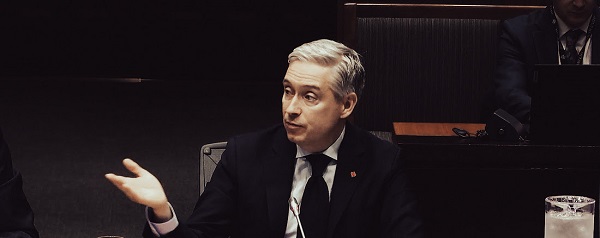Daily Caller
How Trump And Musk Changed The Energy Conversation


From the Daily Caller News Foundation
It is somewhat amazing to reflect on how radically the conversation around energy has transformed in America since 2020. Amid all the societal madness that took place around an array of social issues – race, gender, DEI, disinformation and whether it should be censored – it was easy for many to ignore the similarly mad nature of discussions around energy which happened during the five years from 2020 through 2024.
Those who understand the complexities of energy in all its forms and wished to talk and write about them in a factual manner found themselves often being ordered or otherwise “encouraged” to at best soften their language on such things or, worse, to outright lie about them in order to maintain social license.
True story: In 2021, I was suspended for a full week by old Twitter, one of whose censors bluntly told me that some purely factual information I had written there about the use of coal in power generation was a violation of the platform’s “community standards,” such as they were at the time BE, i.e., Before Elon. A content cop at another social site informed me shortly later that the reason some of my posts were so obviously throttled was that the algorithm had identified me as being, and I quote, “pro-fossil fuels.”
As a nonprofit, we are dependent on the generosity of our readers.
Please consider making a small donation of any amount here.
Thank you!
Never mind that literally every device this censor used in his job and at home was made up largely of parts derived from petroleum, or that his clothes were, as well, or that he no doubt enjoyed working in an office and living in an apartment whose lights and air conditioning were powered by natural gas or coal generation (yes, even in California): My typed words were the larger problem here. I would either bend to the will of the ubiquitous, all-seeing, all-powerful algorithm, or none of my 20,000 or so followers at the time would see anything I posted. Argue too strenuously, and I’d no doubt find myself banned. All because I believe “fossil fuels,” i.e., coal, oil, and natural gas and the hundreds of useful products derived from them are a net good for modern society.
It is not without irony that this madness all began to change shortly after the period of time we should call AM, i.e, “After Musk” arrived at Twitter on Oct. 27, 2022.
Within days of long-time fossil fuels critic Mr. Musk’s taking over what had been arguably the most censorious of all the big social media platforms, signs started to appear that free speech was breaking out all over, at least on that platform, and they gradually spread to other parts of the social media realm. The era of government and big tech social sites conspiring to censor thought and speech was coming to an end. All Americans owe Musk a debt of gratitude for providing the spark that helped beat back what was an extremely dangerous time for their freedoms.
It is no accident that the conversation around the energy transition and net-zero has shifted radically since. It is even less an accident that the shift has accelerated considerably since Jan. 20, when Donald Trump was sworn in as President for the second time.
Today, it is now widely accepted that dreams of a government-subsidized energy transition that controlled every energy conversation from 2020 through 2022 is not just unlikely but impossible. A statement that got me suspended from Facebook 2021 – that it is not possible for wind and solar to displace oil, gas, and coal in power generation due to this thing we call physics – is now a widely accepted energy reality.
The hubristic madness that formed the foundation of federal energy and climate policy through the Obama and Biden years – that carbon dioxide, without which no life on planet Earth would exist, is a “pollutant” to be regulated by federal bureaucrats – now finds itself on the brink of extinction by the same agency, the EPA, which invented it to begin with.
Musk and Trump have apparently terminated their friendship now, but their combined actions have brought U.S. society back to a place where it is again possible – even desirable – to have fact-based discussions about a wide range of issues, including energy, without fear of being cancelled again. That’s something to be grateful for.
David Blackmon is an energy writer and consultant based in Texas. He spent 40 years in the oil and gas business, where he specialized in public policy and communications.
Business
Trump Warns Beijing Of ‘Countermeasures’ As China Tightens Grip On Critical Resources


From the Daily Caller News Foundation
Despite their strategic significance, the U.S. imports 80% of the rare earths it consumes, primarily from China, which dominates global production and controls roughly 92% of the world’s refining capacity.
President Donald Trump on Friday threatened China with a massive tariff hike and hinted his upcoming summit with Chinese President Xi Jinping could be canceled as a result of Beijing’s latest escalation in trade hostilities.
China ramped up its economic pressure campaign this week, first by imposing new export controls Thursday on rare earth minerals critical to the production of vehicles, weapons systems, and other advanced technologies. On Friday, Beijing escalated further, announcing new port fees on American ships and launching an antitrust investigation into U.S. tech giant Qualcomm.
In response to what he described as “great trade hostility,” Trump said there was “no reason” to meet with Xi in South Korea later this month.
Dear Readers:
As a nonprofit, we are dependent on the generosity of our readers.
Please consider making a small donation of any amount here.
Thank you!
“Dependent on what China says about the hostile ‘order’ that they have just put out, I will be forced, as President of the United States of America, to financially counter their move. For every Element that they have been able to monopolize, we have two,” the president posted on Truth Social.
Trump announced later on Friday that the U.S. would impose a 100% tariff on China starting Nov. 1, in addition to existing levies, and implement export controls on “any and all critical software.” He added that the tariffs could go into effect sooner, “depending on any further actions or changes taken by China.”
Despite their strategic significance, the U.S. imports 80% of the rare earths it consumes, primarily from China, which dominates global production and controls roughly 92% of the world’s refining capacity.
Under the new rules, foreign suppliers must obtain Beijing’s approval to export any product made with Chinese rare-earth processing technology or containing rare-earth materials that comprise as little as 0.1% of the item’s value. The restrictions also extend to the export of technology used in rare-earth mining, smelting, and magnet manufacturing, and add five more rare-earth elements to China’s existing control list.
Trump warned that Beijing’s move could “clog” global markets and “make life difficult for virtually every country in the world.”
“I have always felt that they’ve been lying in wait, and now, as usual, I have been proven right! There is no way that China should be allowed to hold the World “captive,” but that seems to have been their plan for quite some time,” the president wrote.
“But the U.S. has Monopoly positions also, much stronger and more far reaching than China’s. I have just not chosen to use them, there was never a reason for me to do so — UNTIL NOW!” Trump said.
The Chinese Transport Ministry also said it will begin collecting port fees on vessels owned by U.S. companies or individuals — and even those built in America — starting Oct. 14. The rollout overlaps with Washington’s plan to impose new charges on large Chinese vessels docking at U.S. ports the same day.
The president also noted that Beijing’s timing was “especially inappropriate,” noting that it coincides with the peace deal he helped broker between Israel and Hamas to bring the two-year conflict to an end.
Daily Caller
Now Is A Great Time To Be Out Of America’s Offshore Wind Business


From the Daily Caller News Foundation
Is the push and pull in the energy and climate regulatory environment hurting the ability for companies to finance and complete energy projects in the United States? The head of Shell in the United States, Colette Hirstius, said she believes it is in a recent interview.
“I think uncertainty in the regulatory environment is very damaging,” Hirstius said, adding, “However far the pendulum swings one way, it’s likely that it’s going to swing just as far the other way.”
Hirstius was addressing the moves made by the Trump administration to slow the progress of the offshore wind industry, which was the crown jewel of the Biden administration’s headlong rush into a government-subsidized energy transition. Trump’s regulators, led by Secretary of Interior Doug Burgum and Energy Secretary Chris Wright, have taken a series of actions in compliance with executive orders signed by Trump since January to halt several projects that were under construction, roll back federal subsidies, and review permits they believe were hastily issued in non-compliance with legally required processes.
Dear Readers:
As a nonprofit, we are dependent on the generosity of our readers.
Please consider making a small donation of any amount here.
Thank you!
That hope seems discordant, coming as it does amid Shell’s ongoing effort to step back from offshore wind and refocus more of its capital budget back to its core oil and gas business following years of unprofitable ventures into renewables. It also seems fair to point out that the political pendulum about which Hirstius warns already swung wildly in favor of offshore wind and other wind and solar projects in the Biden administration. It is odd that Shell only now decides to roll out that particular warning.
Shell was pulling back from its major offshore wind investments while Trump was still fighting off efforts by an array of Democratic prosecutors to put him in prison. In June 2023, for example, the company announced its intent to offload its 50% share in the Southcoast project offshore Connecticut amid Biden era high inflation and supply chain challenges that were already rocking the industry at the time. Nine months later, Shell sold the interest to another party.
The company announced last December that it was “stepping back from new offshore wind investments” as part of a company-wide review implemented by then-new CEO Wael Sawan in mid-2023. A month later, it cancelled its interest in the Atlantic Shores project, writing off $1 billion in investments in the process. Shell’s ventures into the U.S. offshore wind arena had run head-long into economic reality long before the second Trump presidency came along.
That Atlantic Shores project has become an item of special interest inside the Interior Department’s Bureau of Ocean Energy Management (BOEM) in recent days. In a court filing last Friday, BOEM Deputy Director Matthew Giacona said the Bureau plans to conduct a full review of the process that went into approving Atlantic Shores during the Biden presidency. He also said the review would likely expand to other offshore wind projects given the administration’s concerns that Biden’s regulators failed to properly assess the true environmental impacts these major industrial installations create.
In addition to that, the Daily Caller’s Audrey Streb reported on Monday that Biden regulators gave the go-ahead to some of these offshore projects despite internal concerns expressed as early as 2021 that granting long delays in their decommissioning processes “increases risk to the federal taxpayer.” Offshore developers are normally required to provide financial assurance to pre-fund such costs, but big Danish developer Orsted and others were requesting delays as long as 15 years in that requirement to make their project economics work.
Hirstius’s concerns about regulation are absolutely valid: Having such certainty is a crucial element for any company to be able to plan its future business endeavors. But every presidency has a duty to ensure that actions by prior administrations meet the mandates of prevailing laws. It has long been feared that the Biden regulators cut important corners related to environmental and marine mammal protections to speed some offshore wind projects through the process.
As this current review process plays itself out, Shell might well find itself glad it cut its losses in this failing offshore wind sector when it did.
David Blackmon is an energy writer and consultant based in Texas. He spent 40 years in the oil and gas business, where he specialized in public policy and communications.
-

 Alberta1 day ago
Alberta1 day agoFact, fiction, and the pipeline that’s paying Canada’s rent
-

 Energy2 days ago
Energy2 days agoIn the halls of Parliament, Ellis Ross may be the most high-profile advocate of Indigenous-led development in Canada.
-

 Energy2 days ago
Energy2 days ago“It is intellectually dishonest not to acknowledge the … erosion of trust among global customers in Canada’s ability to deliver another oil pipeline.”
-

 Aristotle Foundation2 days ago
Aristotle Foundation2 days agoEfforts to halt Harry Potter event expose the absurdity of trans activism
-

 International16 hours ago
International16 hours agoTrump gets an honourable mention: Nobel winner dedicates peace prize to Trump
-

 Bruce Dowbiggin2 days ago
Bruce Dowbiggin2 days agoCanada’s Humility Gene: Connor Skates But Truckers Get Buried
-

 Business8 hours ago
Business8 hours agoCarney government plans to muddy the fiscal waters in upcoming budget
-

 International1 day ago
International1 day agoTrump-brokered Gaza peace agreement enters first phase



